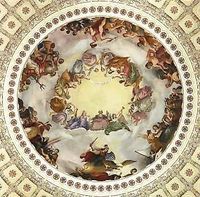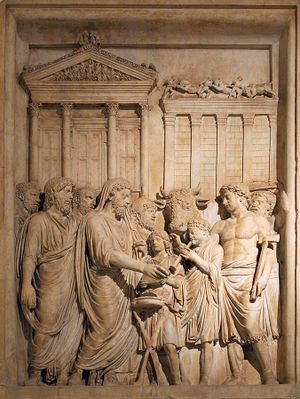Template:Emperator: Difference between revisions
No edit summary |
No edit summary |
||
| Line 1: | Line 1: | ||
[[File:emperors.jpg|right|thumb|Emperors: Ancient past [[Emperor]] of [[Rome]], Modern commander-in-chief of the times and Fictional character of our imagination | [[File:emperors.jpg|right|thumb|Emperors: Ancient past [[Emperor]] of [[Rome]], [[Nero]], a Modern commander-in-chief of the times, [[Ekklesia_10#President_Clinton|Clinton]], and Fictional character of our imagination.]] | ||
== Emperator == | == Emperator == | ||
Revision as of 08:55, 23 November 2022

Emperator
Emperator[1] is a Latin term meaning the commander in chief of the military (a title conferred under the Republic on a victorious general and under the Empire upon the emperor).
The Latin word imperator derives from the stem of the verb imperare, meaning 'to order, to command'. It was originally employed as a title roughly equivalent to commander under the Roman Republic. Later it became a part of the titulature[2] of the Roman Emperors as part of their cognomen[3].
The term Emperator was used to designate the office of Commander in Chief[1] of the Roman Army and Navy and under Augustus Caesar was a ten year term of office requiring an oath of office.
From Rome vs US
There are many things we should understand about Rome in order to understand the governments of today. In 29 B.C. Gaius Octavianus marched into Rome as the “savior of the Republic” and was given the title of Augustus by the Senate. He was then legally granted, under constitutional forms and limitations, the position Emperator.[1] This was one of three offices established to protect the Republic.
Offices of Rome
Emperator
- “Protection draws to it subjection; subjection protection” [4]
The Emperator was ‘commander in chief’ of all military and naval forces, for a period of ten years. He could set foreign policy and establish treaties much as the president of the United States does today.
President
The Principas Civitas, was the ‘First Citizen’ or chief executive officer of Rome, a municipality. At home each year he had to be elected to office, swearing a binding oath read from clay tablets.
- “Thus the republic was restored under the presidency of its ‘first citizen’.”[5]
A republic under an authority that is no longer titular is no longer a pure Republic.

The United States is another government within that Republic but the people have left that Republic and entered into the Democracy. The more the people fail to retain their rights under God the more they remove themselves from the republic and go under the gods many of the world.
Apotheosis
The third office Augustus requested from the Senate was the most interesting and misunderstood. It was the office of God. Actually, he was not just a god, but the ApoTheos, or Originator of gods.
His duties as the originator of gods was to appoint all the lesser gods throughout the empire. These gods were called theos in the Greek. The New Testament translates the word theos into the word gods or God.
The word theos means a judge in a court of law. The Apotheos of the United States, like the Apotheosis or Rome, has the power to appoint federal judges who decide right and wrong or good and evil for the people.
- While history may repeat itself the only thing that we seem to learn from history is that most men do not learn from history.

From Mark of the Beast
Family values were a chief topic of political rhetoric before every election and during the writing of the new constitution by Augustus. The rise of that Empire out of the ashes of a free republic was unrelenting.
After their civil war, the first of the three offices sought by Augustus was Emperator,[6]commander in chief of the army and naval forces. The second office was Principas Civitas, the First Citizen, the chief executive officer or President of Rome,[7] a municipality. The third office was ApoTheos, means literally the raising of a person to the rank of a god. This is why Paul tells us their are gods many
The duties of this office were to appoint all the judges or magistrates for the empirical courts. Each office required an oath based on constitutional restrictions. Successors were determined by an electoral college of the Senate, known as the “Conscripted Fathers.” [8]
From Judge
This apotheosis[9] of presidents was fundamentally no different than the deification of Caesar as god who was also the commander in chief of the military[10] and chief executive officer[11] of the world[12] order of Rome. History does repeat itself if we will not learn from it and if they are going to change our understanding of words we may all be deceived again.[13]
From Imperial Cult of Rome

The Imperial cult of ancient Rome identified emperors and some members of their families with the divinely sanctioned authority of the Roman State.
- ↑ 1.0 1.1 1.2 Emperator, emperatoris m. commander in chief Collins L.E. Dict. ‘62.
- ↑ Any method of naming kings, pharaohs and similar monarchs. A titular ruler, or titular head, is a person in an official position of leadership who possesses few, if any, actual powers. Sometimes a person may inhabit a position of titular leadership and yet exercise more power than would normally be expected, as a result of their personality or experience.
- ↑ The third and usually last name of a citizen of ancient Rome, as Caesar in Gaius Julius Caesar.
- ↑ Protectio trahit subjectionem, subjectio protectionem. Coke, Littl. 65.
- ↑ Encyclopedia Britannica Vol 2, p. 687, ‘53.
- ↑ Emperator, emperatoris m.commander in chief Collins L.E. Dict. '62.
- ↑ : "Thus the republic was restored under the presidency of its 'first citizen' (princeps civitatis)." (Encyclopedia Brittanica Vol 2, p. 687, '53
- ↑ Rome vs. US http://www.hisholychurch.org/news/articles/romeus.php
- ↑ a·poth·e·o·sis 1. “Exaltation to divine rank or stature; deification.” The American Heritage® Dictionary of the English Language, Fourth Edition copyright ©2000 by Houghton Mifflin Company. “the elevation of a person to the rank of a god; deification” Collins English Dictionary – Complete and Unabridged © HarperCollins Publishers 1991, 1994, 1998, 2000, 2003.
1. the elevation of a person to the rank of a god. Random House Kernerman Webster's College Dictionary, © 2010 K Dictionaries Ltd. Copyright 2005, 1997, 1991 by Random House, Inc. - ↑ Emperator, emperatoris m.commander in chief Collins L.E. Dict. ‘62. http://www.hisholychurch.org/news/articles/romeus.php#Emperator
- ↑ http://www.hisholychurch.org/news/articles/romeus.php#President
- ↑ http://www.hisholychurch.org/news/articles/world.php
- ↑ 2 Timothy 3:13 But evil men and seducers shall wax worse and worse, deceiving, and being deceived.